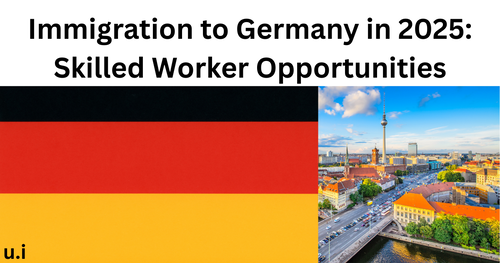Date: August 31, 2025
Category: Job Offers / Immigration
🇩🇪 Why Germany in 2025?
Germany is one of the strongest economies in Europe, famous for its innovation, high-quality education, and demand for skilled workers. In 2025, the country is opening even more opportunities thanks to the Skilled Immigration Act (Fachkräfteeinwanderungsgesetz), making it easier for professionals worldwide to live and work in Germany.
With an aging population and labor shortages, Germany plans to welcome 400,000 skilled workers annually, creating a golden chance for international applicants.
🛠️ Main Immigration Pathways
1. EU Blue Card
- Best option for highly qualified professionals.
- Requires a recognized university degree and a job offer in Germany.
- Minimum annual salary (2025):
- €45,300 for most jobs
- €41,041 for shortage occupations (IT, engineering, healthcare).
2. Job Seeker Visa
- Allows you to enter Germany for up to 6–12 months to find a job.
- Once you secure employment, you can switch to a work visa or Blue Card.
3. Skilled Worker Visa
- Designed for applicants with vocational training or professional experience.
- Your foreign qualifications must be recognized in Germany.
4. Student to PR Pathway
- International students can study in Germany at low tuition costs.
- After graduation, you can apply for an 18-month job-seeking visa, then move to a work visa or PR.
📋 Eligibility Requirements
- Qualification Recognition: Your degree or diploma must be recognized in Germany.
- Language Skills: German language proficiency (B1–B2) is often required, though some IT jobs accept English.
- Job Offer: For most visas, a contract from a German employer is needed.
- Funds: Proof you can support yourself during your stay (approx. €1,200 per month).
💼 Jobs in Demand in Germany (2025)
Germany has huge labor shortages, especially in skilled professions. Here are the top jobs in demand:
| Sector | Example Jobs | Average Salary (€/year) |
|---|---|---|
| IT & Tech | Software Developers, IT Analysts | 55,000 – 80,000 |
| Healthcare | Nurses, Doctors, Caregivers | 45,000 – 85,000 |
| Engineering | Mechanical, Electrical, Civil | 50,000 – 90,000 |
| Skilled Trades | Welders, Electricians, Mechanics | 35,000 – 55,000 |
| Logistics | Truck Drivers, Warehouse Managers | 30,000 – 50,000 |
| Education | Teachers, Early Childhood Educators | 35,000 – 60,000 |
📝 Step-by-Step Application Process
- Check if Your Qualification is Recognized
- Use the official “Anabin” database.
- Improve Your German Language Skills
- Aim for at least B1 level; healthcare often requires B2.
- Apply for a Job in Germany
- Use job portals like Make-it-in-Germany, StepStone, or Indeed Germany.
- Apply for the Visa
- Submit documents at your nearest German consulate/embassy.
- Travel to Germany & Register
- Once in Germany, register your address (Anmeldung) and apply for a residence permit.
💡 Tips for a Successful Application
- Learn German—it increases your job chances dramatically.
- Target shortage occupations (IT, healthcare, engineering) for faster approval.
- Consider a Job Seeker Visa if you don’t yet have an offer.
- Prepare all documents carefully: degree recognition, CV in Europass format, references.
✅ Conclusion
Germany in 2025 is one of the best destinations for skilled workers worldwide. With simplified visa rules, high demand in critical sectors, and excellent salaries, it’s a prime opportunity for professionals seeking stability and growth in Europe.
If you have the skills, now is the right time to apply and start your career in Germany.



